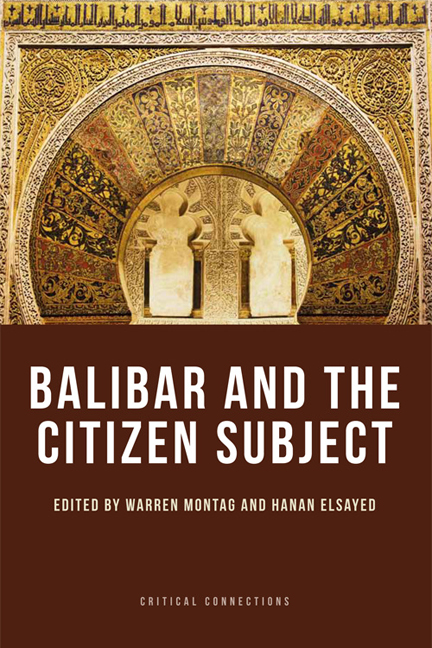Book contents
- Frontmatter
- Contents
- Introduction: Balibar and the Citizen Subject
- Part I Balibar Reading Schmitt Reading Hobbes: Equality or Similitude?
- Part II Transindividual/Universal
- Part III Inequality, Violence and the Possibility of Citizenship
- 8 La Haine: Falling in Slow Motion
- 9 Morbid Perseverance: The Internal Border and White Supremacy
- 10 Just like a Woman: Balibar on the Politics of Reproduction
- 11 Another “Neo-Racism”: Balibar and the Everywhere War
- Notes on Contributors
- Index
10 - Just like a Woman: Balibar on the Politics of Reproduction
from Part III - Inequality, Violence and the Possibility of Citizenship
Published online by Cambridge University Press: 10 January 2018
- Frontmatter
- Contents
- Introduction: Balibar and the Citizen Subject
- Part I Balibar Reading Schmitt Reading Hobbes: Equality or Similitude?
- Part II Transindividual/Universal
- Part III Inequality, Violence and the Possibility of Citizenship
- 8 La Haine: Falling in Slow Motion
- 9 Morbid Perseverance: The Internal Border and White Supremacy
- 10 Just like a Woman: Balibar on the Politics of Reproduction
- 11 Another “Neo-Racism”: Balibar and the Everywhere War
- Notes on Contributors
- Index
Summary
In the selections of his work I will examine here, Balibar creates the conditions of possibility for thinking about women and novels outside the binaries that inevitably oppose women to men and fiction to political philosophy. To understand just how much is at stake in considering women and novels without their definitional opposites, one must begin by establishing what these particular categories of analysis share. Both are included under a dominant term – women, by way of the household, under political society, and novels, by way of realism, under political philosophy. The problem doubles as political philosophy acknowledges that women and novels play a role within modern political societies, only to designate that role as politically insignificant and/ or off limits to political critique. Women and novels mark the point at which the private life of both household and personal experience begins. In practice, this means that if we want to think about women on an equal footing with men, we must think of them as if they were or should be men. So, too, if we want to think of the narrative machinery of novels as comparable to that of political philosophy, we have to discount the very narrative operations that identify novels as works of fiction. In disavowing the political operations of these categories – that amounts to disavowing that their operations are indeed political – we inadvertently acknowledge that they serve as the “exclusive inclusion,” the internal limit and foundation that a modern political society must suppress in order to be just that, a modern political society. Among the growing number of political philosophers who are trying to imagine a world beyond capitalism, Balibar is, to my knowledge, the only one who openly acknowledges that to do so we must confront the roles of women and fiction under capitalism.
The riddle of reproduction
Given his intellectual debt to Louis Althusser and his collaboration with a group of graduates of the École Normale Supérieure in a project “on the French school system” during the period when Althusser was formulating his concept of ideology, it seems fitting that Balibar should still be bent on solving the riddle of Althusser's claim that “the ultimate condition for production is the reproduction of the conditions of production.”
- Type
- Chapter
- Information
- Balibar and the Citizen Subject , pp. 284 - 308Publisher: Edinburgh University PressPrint publication year: 2017

